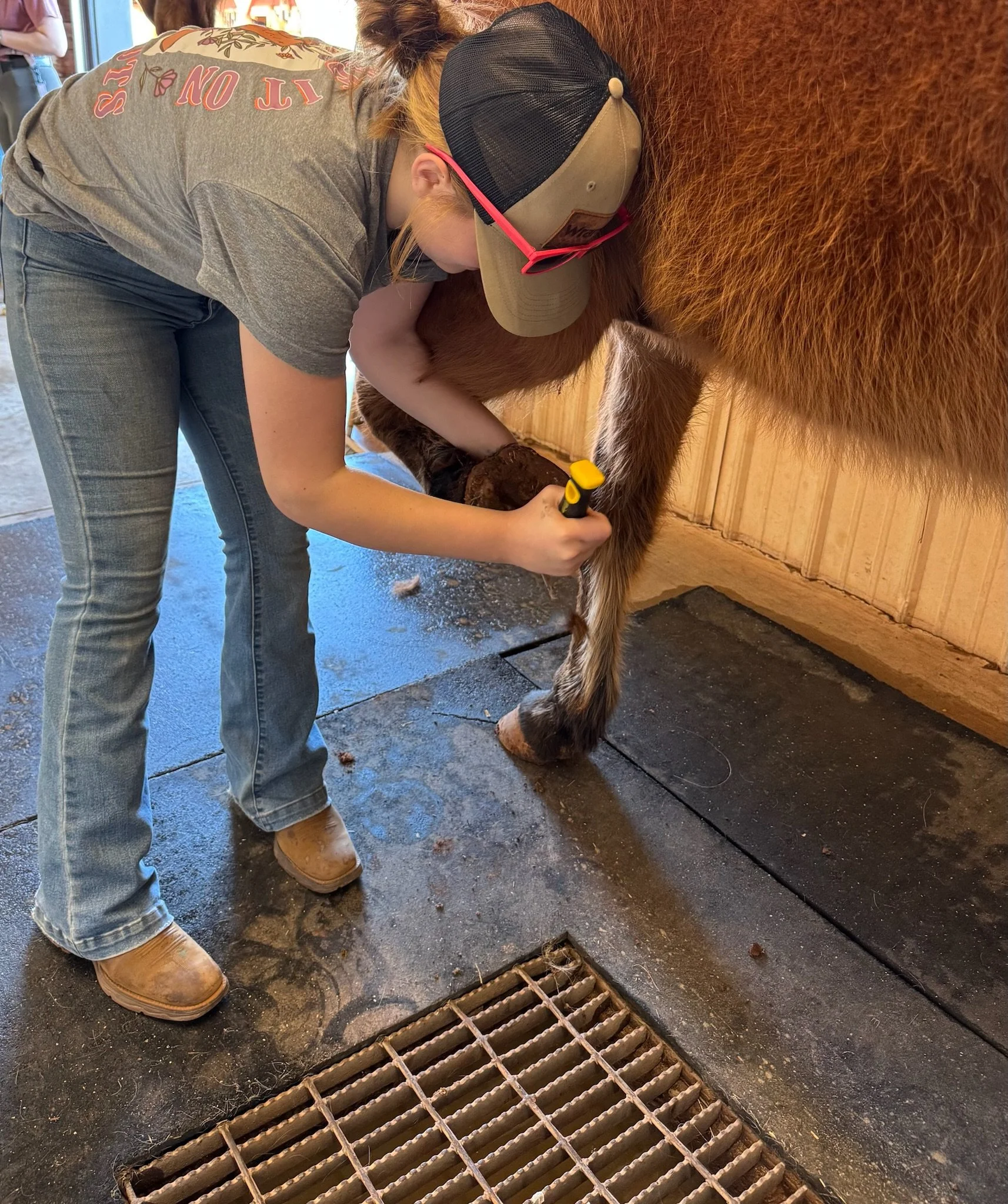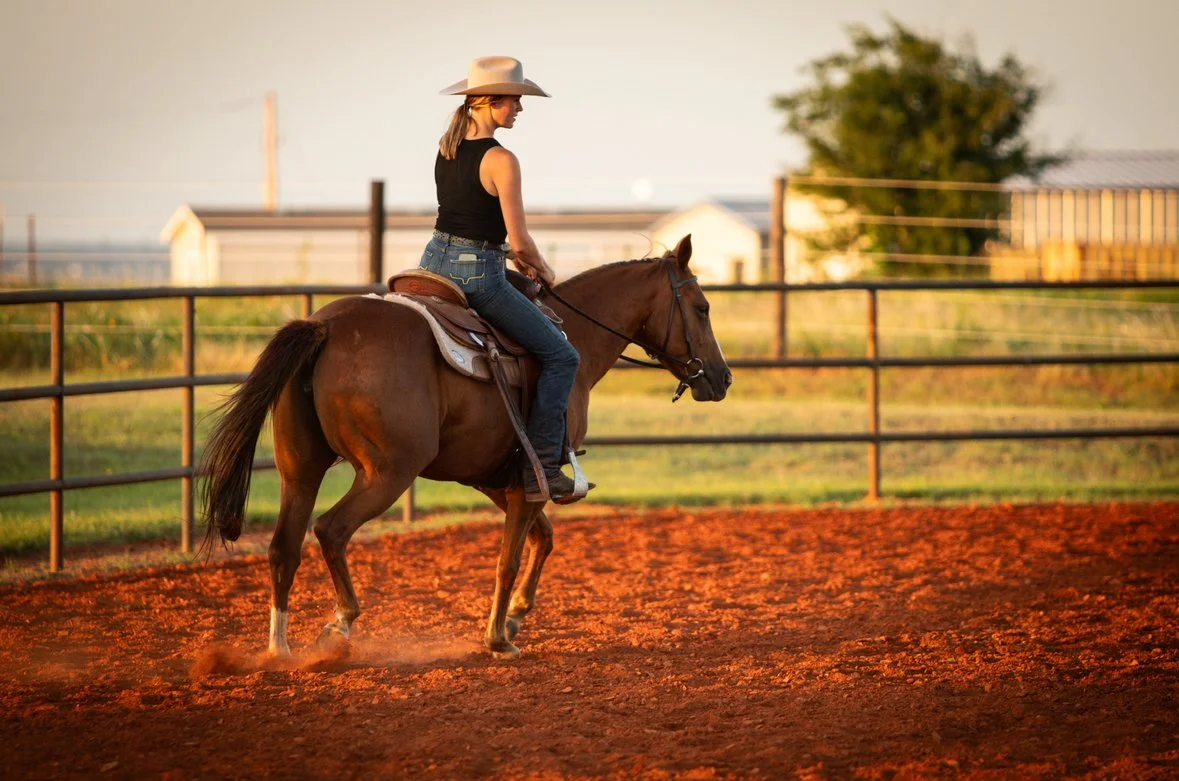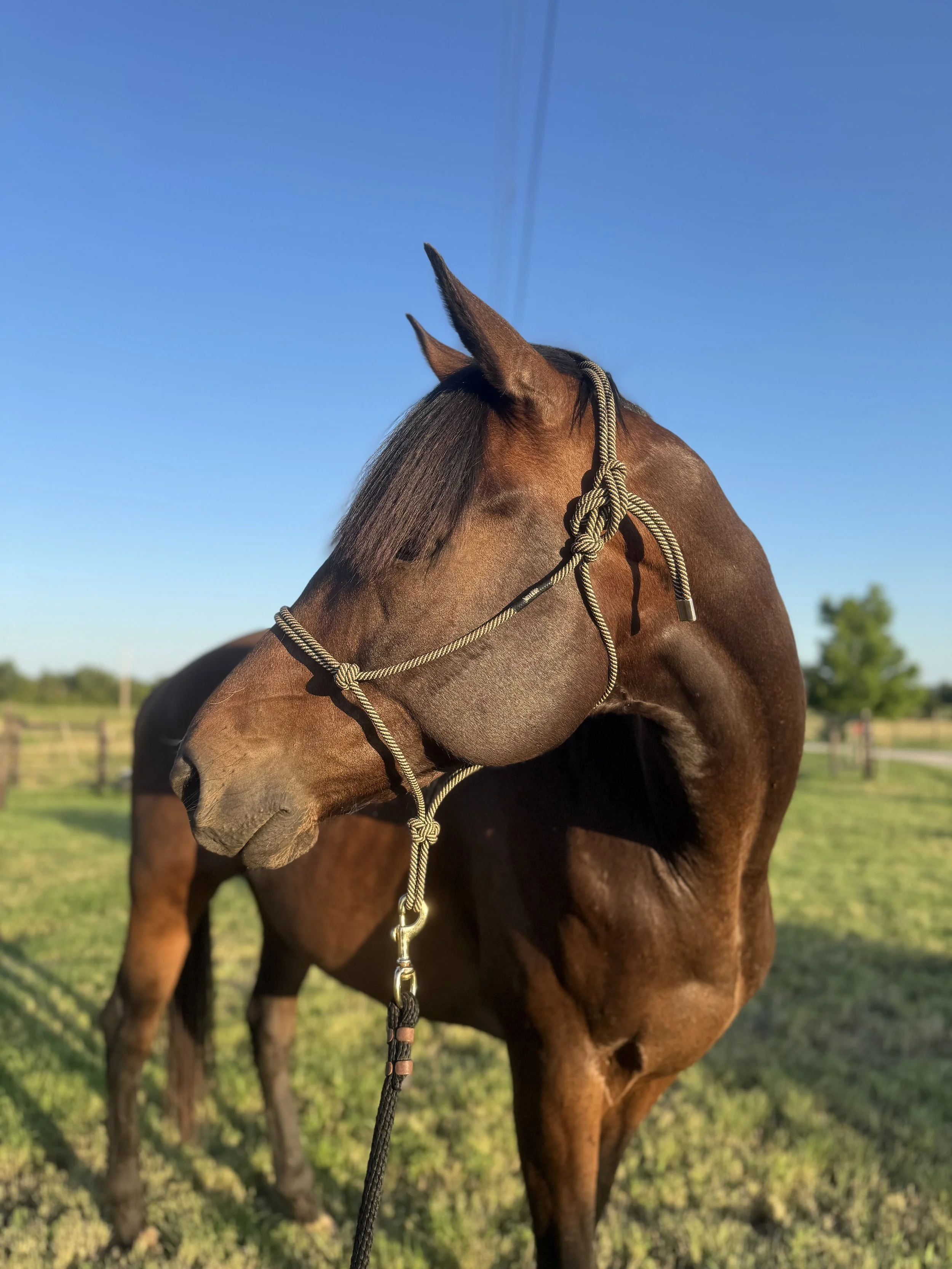Why Kids Benefit from Groundwork Lessons Before They Ride
When most people picture riding lessons for kids, they imagine little boots, shiny helmets, and the excitement of sitting in the saddle for the first time. While riding is an amazing goal, we believe the journey starts on the ground.
When most people picture riding lessons for kids, they imagine little boots, shiny helmets, and the excitement of sitting in the saddle for the first time. While riding is an amazing goal, we believe the journey starts on the ground.
We introduce younger students (under 7 years old) to groundwork lessons before they ever put a foot in the stirrup - and here’s why it matters:
1. Safety Comes First
For kids, horses can feel huge and a little intimidating. Groundwork builds confidence in handling a horse safely from the ground - leading, stopping, backing, and standing calmly.
It also teaches kids something every parent wants: how to stay safe around such a big animal.
We show them where it’s safe to walk (and where it isn’t), how to stay mindful of their own feet around hooves, and how to read important horse “signals” like pinned ears or swishing tails.
These early lessons aren’t just good horsemanship, they’re essential for keeping kids safe.
2. Building a Strong Foundation
Horsemanship isn’t just about riding, it’s about communication. Groundwork teaches kids how horses think and respond. By learning to read body language and give clear signals, children understand their horse long before they ride.
3. Age-Appropriate Skills
Young kids don’t always have the balance, strength, or focus to ride right away. Groundwork keeps them engaged and successful while meeting them at their level. It isn’t all work - we make time on the ground fun with goal-oriented games like weaving through cones or gathering rings, all while staying mindful of their horse’s presence. These activities build confidence, coordination, and awareness in a way that feels more like play than practice.
4. Bonding Before the Saddle
When a child learns to connect with their horse on the ground, the bond they form is priceless. That trust carries into the saddle later, making the first rides smoother and more enjoyable.
5. Setting Kids Up for Success
By the time they’re ready to ride, groundwork students already know the basics of horse care, handling, and communication. This gives them a head start, making the transition to riding both safer and more rewarding.
At Unlimited Learning Equestrian, we believe every rider, no matter their age, deserves a strong start. For kids under 7, groundwork lessons are more than a placeholder; they’re the beginning of a lifelong partnership with horses.
The Power of Going Slow – Why Rushing Progress Can Backfire
We say it often: slow is smooth, and smooth becomes fast. But in a world of instant results and overnight transformations, that mindset can feel frustrating—especially when you’re working with horses.
At Unlimited Learning, we say it often: slow is smooth, and smooth becomes fast. But in a world of instant results and overnight transformations, that mindset can feel frustrating—especially when you’re working with horses.
But here’s the truth:
The slow work is the strong work.
Why rushing rarely works
Horses don’t learn through just pressure, they learn through clarity and consistency. When we rush them through training steps just to reach the “fun” stuff faster, we often miss important layers (often called “holes”). That’s when the problems show up- miscommunication, tension, anxiety, refusal.
What going “slow” actually looks like
Going slow doesn’t mean doing less. It means doing the right things at the right pace—based on what your horse is ready for.
Sometimes it means repeating a groundwork exercise until your horse offers softness without resistance.
Sometimes it means sitting in the barn aisle for 10 minutes just letting your horse be.
Sometimes it means ending a ride early because your horse tried really hard—and that’s enough.
It builds trust, not just tolerance
Going slow teaches your horse that you're someone worth listening to. That you won’t skip steps just to satisfy your own timeline.
That you’ll wait, adjust, and try again until you’re both ready to move forward together.
Final thought:
You don’t have to be the fastest.
You don’t have to be the flashiest.
You just have to be present.
Let the work take the time it takes—your horse will thank you for it.
Ready to train with support, not pressure? We’re here when you’re ready.
Groundwork Isn’t Optional: Why Every Horse Needs It
We talk a lot about foundations—because whether you’re training a colt, retraining a show horse, or just trying to avoid getting stepped on in the barn aisle, groundwork is where it all begins.
A guide for beginners… and know-it-alls alike.
We talk a lot about foundations—because whether you’re training a colt, retraining a show horse, or just trying to avoid getting stepped on in the barn aisle, groundwork is where it all begins.
And no, groundwork isn’t just for “problem horses” or green riders. It’s not something you graduate from and never revisit. It’s a tool. A language. And frankly? A superpower.
Here’s why every horse—at every stage—needs consistent, thoughtful groundwork.
Groundwork Builds Understanding
When we talk about groundwork, we’re not just talking about lunging in circles or teaching your horse to move over when you poke them. We’re talking about communication.
Groundwork helps your horse understand: How to respond to pressure instead of react
What your body language means
When to relax vs. when to move
That you're someone to trust, not fear
Before we expect anything under saddle, we teach it on the ground. Because a horse that understands you with four feet planted firmly on the earth will carry that trust into the saddle.
Groundwork Teaches Boundaries (Kindly)
Ever had a horse walk through your personal space? Lean on the lead rope? Plant their feet and say “nah” when you ask them to load in the trailer?
That’s not attitude. That’s unclear boundaries. Groundwork gives us the chance to show our horses what we expect—without chaos, force, or panic. It’s not about dominance. It’s about clarity and consistency.
Groundwork Builds Confidence
Scary tarp? Flapping flag? Puddle of doom? Groundwork is your horse’s safe zone for learning how to handle it all.
We love using groundwork to build desensitization and bravery—especially with younger horses or those new to the show ring. If a horse can handle the pressure on the ground, they’re far more likely to stay soft, present, and rideable when it really counts.
Groundwork Strengthens the Bond
Spending time on the ground isn't "less than" riding. In fact, it can be more powerful.
Horses learn to look to you for direction, and riders start noticing subtle cues they’d miss from the saddle.
It’s trust-building in its purest form.
So… What Should Groundwork Look Like?
At Unlimited Learning, we tailor groundwork to the horse in front of us. But it often includes:
Leading with softness
Moving away from pressure (yielding shoulders, hindquarters, etc.)
Backing up with light cues
Standing tied calmly
Desensitization to touch, objects, or movement
Prepping for under-saddle work with intention
And yes, we do it with our seasoned show horses just as much as our baby green beans. Why? Because it works.
Final Thoughts: It’s Not a Step—It’s a FoundationGroundwork isn’t a phase to rush through. It’s not just a box to check. It’s the foundation we build every ride on.
So whether you’re new to the horse world or think you’ve “done all the basics”—we challenge you to slow down, drop the ego, and pick up the lead rope. Your horse will thank you.
What Is Foundational Horsemanship (And Why Does It Matter?)
If you've spent any time around horses, you've probably heard the phrase "It all starts with the foundation." But what does that really mean?
If you've spent any time around horses, you've probably heard the phrase "It all starts with the foundation." But what does that really mean?
Foundational Horsemanship isn't just a catchy term—it's the heart of everything we do. It's our compass in the arena, on the trail, and at every barn we visit.
Whether you're brand new to riding or looking to retrain an older horse, we believe success starts with one simple principle: understanding the why.
Foundation First, Always
So, what is Foundational Horsemanship? It's more than just groundwork or beginner lessons.
It's about building a solid partnership between horse and rider by teaching communication, trust, and adaptability-before asking for performance or perfection.
It's the quiet moments.
It's the consistency.
It's listening to your horse before you ask them to listen to you.
We help our clients-both equine and human-learn at their own pace, free from pressure, deadlines, or ego. There's no timeline here, just transformation.
The Difference Between "How" and "Why"
In many traditional lesson programs, students are taught how to ride:
Heels down.
Eyes up.
Post on the correct diagonal.
Sound familiar?
But in our program, we go deeper. We don't just want you to know what to do—we want you to understand why you're doing it.
Because when you understand the why, you become more adaptable. More confident. More compassionate. And ultimately, more effective with every horse you meet.
We take great pride in the horses and riders we help shape—and in many ways, yes, we are results-based. But the difference lies in how we get there.
Our results aren’t driven by pressure or performance checklists—they’re rooted in a slower, more intentional process that prioritizes understanding, adaptability, and trust. When horse and rider truly connect, the progress speaks for itself.
• Letting horses learn without force.
• Giving riders space to ask questions.
• Building skills that translate from the barn to the show ring—and everywhere in between.
Why It Matters
When you start with a solid foundation, everything else becomes easier. Horses become more willing. Riders become more thoughtful. And together, you start to speak the same language.
Whether you're riding a seasoned show horse or your backyard rescue, foundational work builds a relationship that lasts.
That's what we care about at Unlimited Learning Equestrian.
Not just better riders.
Better partnerships.
Ready to Start at the Foundation?
We offer lessons across a variety of formats-groundwork, mounted, at-home, and haul-in—all designed to meet you where you and your horse are right now.




